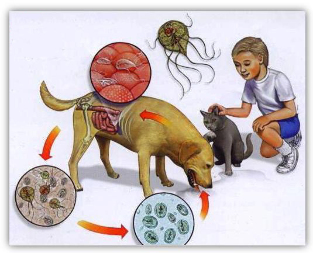Parasites are microorganisms that survive by feeding on host organisms. They live in the human body, cause serious health problems, and can be fatal due to reproduction.
Parasites are usually divided into two types:
- Animal parasites, including parasites (worms, flatworms), spiders, , mollusks, etc.
- Plant parasites are parasitic plants, viruses, pathogenic fungi, etc.
In addition, some viruses that live on parasites at the expense of foreign organisms can also be classified as parasites.
Unfortunately, even modern society cannot fully protect itself from parasite infections, but if the parasites are analyzed in time, they can be prevented from reproducing and get rid of them without causing serious health damage.
Symptoms indicate the presence of parasites in the human body
Parasites enter the human body through natural openings such as the mouth, genitals and anus. Worms rarely penetrate the skin, urogenital system or ears.
The pathogen of the disease can be spread by contact with food and water (most worms), contact with the body of an infected person (pinworm), through soil, air or dust (roundworm).
In most cases, invasive diseases are asymptomatic, and I have not been shown their existence at all. However, due to overreproduction, there are signs of various diseases. These signs usually do not indicate the presence of parasites. The inability to make a correct diagnosis greatly complicates the treatment.
However, there are many signs that can assume the presence of parasites in the human body.
where:
- Often headaches;
- Regular joint pain;
- Unreasonable muscle pain;
- I often catch colds;
- Allergic rash;
- Difficulty defecation and constipation;
- Grind your teeth during sleep;
- Low efficiency, continuous fatigue;
- Increased neuroticism;
- Insomnia;
- Cracked heel;
- Shortness of breath;
- Rupture of the digestive tract;
- The weight fluctuates sharply;
- The fragility of the nail plate;
- Anal itching.
Tumor
It should be borne in mind that parasitic diseases can cause serious problems. For example, a large number of worms can merge and cause intestinal obstruction.
Parasites can also cause chronic cell damage, cancer, anemia or jaundice.
Signs of parasites in children

Used to identify the symptoms of parasites in children:
- Violation of daily diet (loss of appetite, binge eating);
- Increased body temperature;
- Allergic rash;
- There are dark circles under the eyes;
- pale skin;
- Enteropathy (mucus or constipation and diarrhea);
- Nausea and vomiting are mainly in the morning.
Most parasites cannot leave the body on their own. Therefore, if at least one of the above symptoms is manifested, you must contact a local therapist or pediatrician to perform a parasite test and treat the worm.
Diagnosis of aggressive diseases
The diagnosis of invasive diseases involves the detection of parasites (pinworms, amoeba) and their reproductive products (larvae, eggs). Blood tests, stool, tissue scraping or sputum tests have been pre-specified. To study the sample, execute:
- Histological examination;
- Immunological research;
- Hemoscopy;
- Nutrition resonance test.
Test for the presence of parasites in children

Before going to a specialist, parents often want to know what tests are needed to identify parasites in children and which methods can produce more accurate results. According to the location and type of parasites, invasive diseases of children are analyzed.
Most frequently assigned:
- ELISA method for
- blood test;
- Serological examination;
- Scratch or smear by PCR method;
- Blood tests for adults and children.
Blood tests are the most effective type of research, allowing you to determine the exact picture of the disease, the type of worm, and the ability to reproduce. It allows you to determine the presence of asparagus, toxoplasma, cysticercosis, amoeba and lichens.
One type of this type of research is the ELISA blood test, which allows you to assess the level of certain antibodies in the plasma, determine the stage of infection, study the body’s immune response to worms, and identify specific bloodelement.
Advantages of ELISA research:
- The accuracy of the results has nothing to do with the qualifications and experience of the laboratory assistant;
- The analysis sensitivity is high, and the accuracy is up to 90%;
- can show the complete picture of the disease and the number of parasites;
- Parasites are diagnosed in the early stages of development;
- The ability to monitor disease dynamics;
- Measure the presence of toxic products in the blood.
When interpreting the results, the color of the reagent and the intensity of the shadow of the sample should be considered. The ratio of antibodies to parasite antigens is measured by the levels of IgM and IgG markers in the blood. Throughout the existence of worms, high concentrations of IgM and IgG are maintained.
If the blood test shows high IgM levels, the disease is acute. IgG antibodies represent the chronic form of the disease.
Blood tests can diagnose parasitic diseases:
- Obtain ELISA blood test results of
- within 7 days, and get scratches, smears and stool samples after 1-2 days.
- Research must be conducted in a dedicated laboratory, and there is a fee.
It is recommended to donate blood on an empty stomach in the first half of the day; it is recommended not to take medicine 12-15 hours before blood collection. It is recommended that parents prepare their children in advance.
Stool analysis

Preliminary identification of worms in traditional methods may require microscopic analysis of feces. During the study, it was determined whether there were parasite eggs in the stool fragments.
The most accurate result is the result of 3 tests performed in a week.
For the most accurate results, stool fragments must be submitted to the laboratory for examination within 45 minutes after defecation.
During the research process, parasites such as:
- tapeworm;
- Subject;
- Worms.
This type of diagnosis is very easy and cannot be claimed to be 100% accurate. This is because the parasites that exist in the human body may not lay eggs for a long time.



























